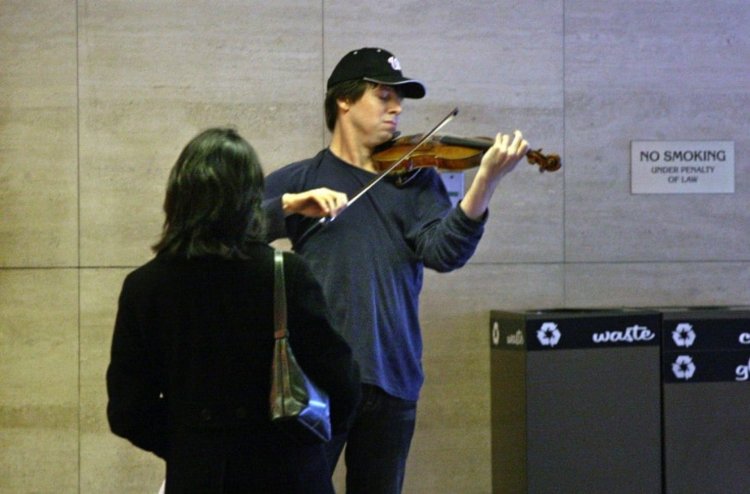Kolkata independent musicians might have found their audience in the streets, here’s their story

While closed spaces such as stages, clubs, and halls can accommodate a limited audience, with an entire world in front of them, the streets are where the real audience lies.
A man stood wearing a baseball cap at the L’enfant Plaza Station during the early hours of the day when at least a thousand commuters were rushing to work. While most of them barely threw a glance at him, some just walked away after dropping a quarter or two in front of him. A few who perhaps still prefer classical over punk stood for a few seconds to hear the man play the exact notes on his violin. Only one among those 1097 people who walked right across the man had realized that the musician standing in the corner, his face barely visible due to the cap, was none other than Joshua Bell who for his 45-minutes-long performance where he played six classical pieces at the metro station had managed to collect $32.17 from 27 people. This experiment certainly earned Gene Weingarten the 2008 Pulitzer Prize for Feature Writing for his article about the experiment on Washington Post but it also established a simple yet significant fact, anyone can be ignored on the streets - even Joshua Bell.
About a decade later, let’s come to the heat trodden streets of Kolkata. Be it the bustling areas like Gariahat, Jadavpur, or Esplanade, some musicians, who have not attached themselves with commercial labels but continue to pursue the art form that they do best, begin to sing their original compositions; and this time the crowd listens. Kolkata’s independent music scene is not mythical tale for those who like to listen to music that is not ornamented. With some independent organisations such as Friday Night Originals the independent musicians are churning out their original compositions in large numbers. However, there are still some who like to reach out to the audience in a more intimate manner.
Speaking with Arjun Kar, a musician who is often busking in the busy streets of the city had faced a difficult time when he arrived to the city and tried to create his own space as one of the musicians. He found it disheartening when there wasn’t enough response after he tried speaking with people about his performance. In a brief conversation, he mentioned that when he approached event organisers, clubs, pubs, and cafes - which are expected to open up spaces for indie musicians - he did not get what he wanted. However, he continued pursuing music and began teaching at several schools across the city, which was barely enough for him to survive. “First of all, I needed money,” he stated during a conversation, “Secondly, when I was sharing my compositions at any pub or at some gathering, I always felt it wasn’t working out.”
He constantly felt that his songs weren’t making their way to people as he would have wanted them to. Quite expectedly, those who arrive in pubs barely listen to the musicians who are performing on stage- a common obstacle faced by some bands as popular as Parvaaz. “This is why I go to the streets because that is where I get the response,” Arjun said. He continued, “When I sing there and explain myself, people listen to me and they pay.” He shared once such incident when he was busking at Nandan where he had received an audience count that can easily exceed 150. “They listened to me, they cheered me, they even sang with me.” As a performer, he has carried out his act in some of the populous areas of the city which includes the Indian Museum.
Arjun Kar took to the streets where he found the audience he is looking for. (Pic Courtesy: Simran Pujari)
Although unlike other street musicians, Arjun claims to have not faced any major obstacle while performing, he was however asked to leave by the police when he performed in front of the Indian Museum. “I asked me to move saying this is not the place to sing. I said I am only my music, there are people selling ice-cream and balloons, and so what is wrong with playing music? But they said this is not a place to sing, if I had to sing I have to go somewhere else. They said Kolkata’s footpath is still not prepared for music.” However, there have also some strange experiences which he didn’t mind sharing on a lighter note. “I was singing in front of Nandan, and an old woman saw me. I don’t what happened but maybe she saw a boy with rough hair singing at the top of his voice, maybe she thought something. She gave me two rupees and blessed me.”
It can be said that while the streets have given Arjun the audience he wanted with the freedom to sing the songs he composed, for a band like Lal On busking takes a whole new purpose. Dibyokamal Mitra describes the band as, “We perform on the street but we don’t perform without an aim. None of us depend on street music for money. We are either students or professionals, and all five of us have a relation with Leftist politics. As a research scholar who recently completed his M.Phil. from Jadavpur University, he completely agrees that what the band does is a political propaganda. He explained, “Our approach to music is not just for the sake of music but a way of getting out ideas to people as opposed to slogans. It is a more effective way of communicating with people. So in a nutshell the reason we sing Leftist songs in the road is because it is easier to communicate with people, and is people agree or disagree they actually come up to you.”

Dibyokamal takes to the streets with the band Lal On in order to create awareness on political issues. (Friday Night Originals)
It can be said for Lal On busking is a way to a more healthier debate on politics. Dibyokamal said, “It happens quite regularly because this is more approachable than watching someone in a rally.” Almost breaking the fourth wall between the performer and the audience, Lal On makes it easier for their listeners to directly communicate with them. “If the group is singing on the street, the engagement if much higher.” He stated that the band’s goal is to fight against communal polarisation.
Speaking with both Arjun and Dibyokamal both of whom see the street as a more independent platform where artistes have the scope to present themselves the way they want, it can be said Busking almost acts in a reverse manner as compared to a stage performance. Dibyokamal elaborated on the idea as he explained, “When you perform on the street, you don’t have the option of an exit or an entrance which is a main feature of performing in a hall. We let it go when you set out on the street.” In the street, as we had witnessed with the Joshua Bell Experiment, people are free to come and go whenever they want, it is up to them if they want to watch the performance and pay, or simply walk away. Although both the artistes that we spoke with busk under very different conditions, performing on the streets can certainly be a way to identify the right kind of audience for the musicians who have not signed themselves with any commercial label.















































